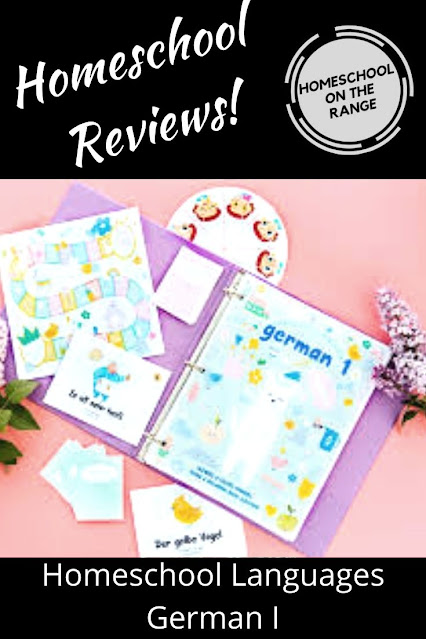Our son is a collector of languages...he loves them all! In his short time here, he has studied Latin, Greek, Egyptian, Celtic, Italian, Spanish, Yiddish, Hebrew, Quenya, and Mandarin. That last one isn't really going so well...Chinese is extraordinarily difficult to learn as it is so very different from the other languages on that list. As there's a first time for everything, he decided to cut his losses there and move on to German! After all, a medieval reenactor needs to speak the language, right?
I stumbled upon the Homeschool Languages curriculum, which is a full curriculum that introduces you to the language, how it is constructed, and how it works. The course teaches vocabulary plus how to conjugate and put phrases together. As he loves to try out all things language-oriented, we decided to give it a go!
What's Included with Homeschool Languages?
- Textbook: 40 lessons, with extra practice and 4 unit reviews that replace lesson days. These are prepped for you.
- In the Level 1 curriculum, there are four units:
- UNIT 1: MANNERS
- UNIT 2: LET'S GO
- UNIT 3: AROUND THE HOUSE
- UNIT 4: IN THE KITCHEN
- Booklets: 17 mini-booklets review phrases taught
- A game board and pieces: A simple, double-sided game board that can be used for a variety of games that reinforce language learning. (Pieces are included with physical copy only- board is included in printable version.)
- Flash cards: These can also be used for games
- Display cards: A few cards you can display around your home to help you remember to use your new phrases in daily life!
- **The physical copy of the curriculum also includes an inflatable globe and a puppet.

In addition to the course, there are targeted units that add more vocabulary. These are word banks for things like going to the grocery store, riding in the car, and around town. If you'd like to learn more about the specific units - and pick up the shopping unit totally FREE - check those out here.
There are three projected levels to Homeschool Languages. Each will build off the former and incorporate consistent review for cyclical learning.
- Level 1. (current level) Around the house: present tense, talking about I, you, we, commands.
- Level 2. Meeting new people: describing things/others, continuation of present tense, talking about others (he/she/they).
- Level 3. Past tense and telling stories. Will include future tense only as a review of "I'm going to/you're going to/etc, not as "I will."
What does a lesson look like?
- Each lesson starts with a song. These teach vocabulary and phrases, and you access them through their YouTube videos.
- Then there is the meat of the lesson. Blue sections tell you, the teacher, what to do, and then the black section is what you say to the student. In bold are the words in the new language so they're easy to identify! These lessons are open-and-go for the homeschooling parent.
- Games help to further the understanding of concepts and cultural aspects.
- End with a booklet. These mini-books give your child confidence in the language, using the words they have learned. They're short and sweet, and you're instructed to have your child repeat each line after you so they can practice forming the new language. (For non-natives, pronunciation is given on each page!)
- Cool down with a song playlist. More YouTube links get your child hearing more of the new words in fun and different settings. Hearing the words and cadences are important when learning a new language, as this helps to create new neural pathways.
Peek inside the curriculum!
Why is it still great for teens?
- Because it's written in an open-and-go format to teach younger kids, he is able to work his way through the course work independently.
- Culture is used throughout the curriculum to further what is taught. It creates a sense of familiarity with the language and it's people! We like to incorporate Google Earth exploration alongside the cultural aspects, covering geography as well.
- There are 17 mini-books included that review phrases as they're taught in the curriculum! While the imagery on them is young (remember, target age is 4-10), they still help to reinforce the concepts and phrases in a way that is easy for him to remember.
- The curriculum also includes spinners, game boards, and cards for a variety of games, all of which are included. Learning and review can stop being a chore, and instead becomes family night! Admittedly, as the rest of us are pretty burnt out on trying to keep up with his language-hopping, none of us has jumped at playing games with him yet. BUT I have some friends with German-learning teens and we are working on coordinating game night held virtually!
How is our teen using this?
- He is incorporating some of the charts and graphics we already own through TalkBox.Mom. (Find out more about their curriculum, and snag a coupon code, here.) These charts go in distinct places, such as the bathroom and kitchen, around the house and remind him of his vocabulary.
- He is listening to German on the Mango Languages app. This is more of a conversational program, and helps to reinforce pronunciation.
- He is watching his medieval / blacksmithing videos on YouTube, many of which are in German, for more exposure to the languages. Plus he was going to watch these anyway...
- He is bugging mom by asking her questions in German while she is trying to navigate city traffic...which is always fun for everyone!
Click the graphic below to try two full weeks of the curriculum for free! As an added bonus for our readers, use code YVIE2022 to get a free unit of your choice. Expires 12/31/2022.




No comments:
Post a Comment
Note: Only a member of this blog may post a comment.